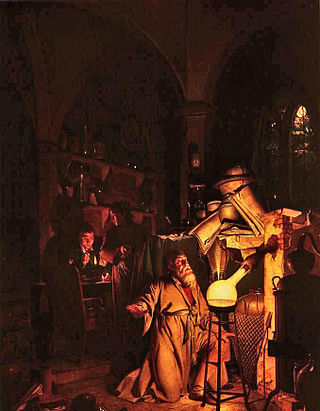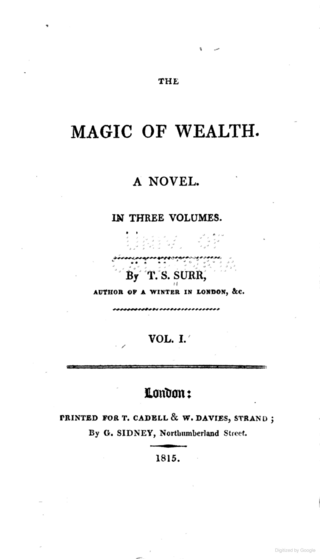
A ballad is a form of verse, often a narrative set to music. Ballads derive from the medieval French chanson balladée or ballade, which were originally "dance songs". Ballads were particularly characteristic of the popular poetry and song of Britain and Ireland from the Late Middle Ages until the 19th century. They were widely used across Europe, and later in Australia, North Africa, North America and South America.

Romanticism is an artistic and intellectual movement that originated in Europe towards the end of the 18th century. For most of the Western world, it was at its peak from approximately 1800 to 1850. Romanticism was characterized by its emphasis on emotion and individualism as well as glorification of the past and nature, preferring the medieval over the classical. Romanticism was partly a reaction to the Industrial Revolution, and the prevailing ideology of the Age of Enlightenment, especially the scientific rationalization of Nature. It was embodied most strongly in the visual arts, music, and literature; it also had a major impact on historiography, education, chess, social sciences, and the natural sciences. It had a significant and complex effect on politics: Romantic thinking influenced conservatism, liberalism, radicalism, and nationalism.

Modern lyric poetry is a formal type of poetry which expresses personal emotions or feelings, typically spoken in the first person.

The term neo-romanticism is used to cover a variety of movements in philosophy, literature, music, painting, and architecture, as well as social movements, that exist after and incorporate elements from the era of Romanticism.
British literature is literature from the United Kingdom of Great Britain and Northern Ireland, the Isle of Man, and the Channel Islands. This article covers British literature in the English language. Anglo-Saxon literature is included, and there is some discussion of Latin and Anglo-Norman literature, where literature in these languages relate to the early development of the English language and literature. There is also some brief discussion of major figures who wrote in Scots, but the main discussion is in the various Scottish literature articles.
In contemporary literary studies, a theme is a central topic, subject, or message within a narrative. Themes can be divided into two categories: a work's thematic concept is what readers "think the work is about" and its thematic statement being "what the work says about the subject". Themes are often distinguished from premises.

Fantasy literature is literature set in an imaginary universe, often but not always without any locations, events, or people from the real world. Magic, the supernatural and magical creatures are common in many of these imaginary worlds. Fantasy literature may be directed at both children and adults.
Jonathan Michie is a British economist who is president of Kellogg College, Oxford, where he is professor of innovation and knowledge exchange.

Donald Michie was a British researcher in artificial intelligence. During World War II, Michie worked for the Government Code and Cypher School at Bletchley Park, contributing to the effort to solve "Tunny", a German teleprinter cipher.
Sindhi literature is the collection of oral and written literature in the Sindhi language in prose and poetry. The Sindhi language of the province of Sindh in Pakistan is considered one of the oldest languages of ancient India, and influenced the language of Indus Valley inhabitants. Sindhi literature has developed over a thousand years.
Susan Fiona Dorinthea Michie is a British academic, clinical psychologist, and professor of health psychology, director of The Centre for Behaviour Change and head of The Health Psychology Research Group, all at University College London. She is also an advisor to the British Government via the SAGE advisory group on matters concerning behavioural compliance with government regulations during the COVID-19 pandemic. In 2022, she was appointed Chair of the World Health Organisation’s (WHO) Technical Advisory Group on Behavioural Insights and Sciences for Health.
The Romantic hero is a literary archetype referring to a character that rejects established norms and conventions, has been rejected by society, and has themselves at the center of their own existence. The Romantic hero is often the protagonist in a literary work, and the primary focus is on the character's thoughts rather than their actions.

Elements of the supernatural and the fantastic were an element of literature from its beginning, though the idea of a distinct genre, in the modern sense, is less than two centuries old.

English literature is literature written in the English language from the English-speaking world. The English language has developed over the course of more than 1,400 years. The earliest forms of English, a set of Anglo-Frisian dialects brought to Great Britain by Anglo-Saxon invaders in the fifth century, are called Old English. Beowulf is the most famous work in Old English, and has achieved national epic status in England, despite being set in Scandinavia. However, following the Norman conquest of England in 1066, the written form of the Anglo-Saxon language became less common. Under the influence of the new aristocracy, French became the standard language of courts, parliament, and polite society. The English spoken after the Normans came is known as Middle English. This form of English lasted until the 1470s, when the Chancery Standard, a London-based form of English, became widespread. Geoffrey Chaucer (1343–1400), author of The Canterbury Tales, was a significant figure in the development of the legitimacy of vernacular Middle English at a time when the dominant literary languages in England were still French and Latin. The invention of the printing press by Johannes Gutenberg in 1439 also helped to standardise the language, as did the King James Bible (1611), and the Great Vowel Shift.
Ernest James Stewart Michie was a Scottish international rugby union player, who played for Scotland and the Lions. He played at Lock and his nickname was "Fourteen". He weighed 14 stone.

Romanticism in Scotland was an artistic, literary and intellectual movement that developed between the late eighteenth and the early nineteenth centuries. It was part of the wider European Romantic movement, which was partly a reaction against the Age of Enlightenment, emphasising individual, national and emotional responses, moving beyond Renaissance and Classicist models, particularly into nostalgia for the Middle Ages. The concept of a separate national Scottish Romanticism was first articulated by the critics Ian Duncan and Murray Pittock in the Scottish Romanticism in World Literatures Conference held at UC Berkeley in 2006 and in the latter's Scottish and Irish Romanticism (2008), which argued for a national Romanticism based on the concepts of a distinct national public sphere and differentiated inflection of literary genres; the use of Scots language; the creation of a heroic national history through an Ossianic or Scottian 'taxonomy of glory' and the performance of a distinct national self in diaspora.

"The Free Besieged" is an epic, unfinished work, composed by Dionysios Solomos and inspired by the third siege of Missolonghi (1825–1826), a crucial conflict of the Greek War of Independence. It is not a single work, but consists of three separate poems in fragmentary form. The Free Besieged is considered one of the greatest poems of Solomos, national poet of Greece.

Sir Archibald Alison, 1st Baronet, was a Scottish advocate (attorney) and historian. He held several prominent legal appointments. He was the younger son of the Episcopalian cleric and author Archibald Alison. His elder brother was the physician and social reformer William Alison.
James Crain Michie was an English-born poet, translator and editor, of a Scottish and American family.

The Magic of Wealth is an 1815 novel by the British writer Thomas Skinner Surr, published in three volumes by Cadell & Davies in London. It focuses on the development of a new resort town by financial speculators. Surr negatively contrasts the speculative banker behind the development with the traditional elite represented by the local squire. Thematically it is similar to Jane Austen's unfinished Sanditon (1817) and Walter Scott's Saint Ronan's Well (1823). Surr's criticism of banks and financial speculation was a common theme in other novels of the era, including Thomas Gaspey's Calthorpe (1821).











